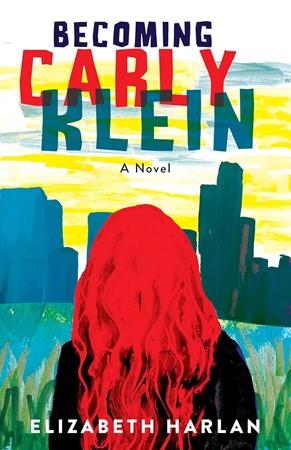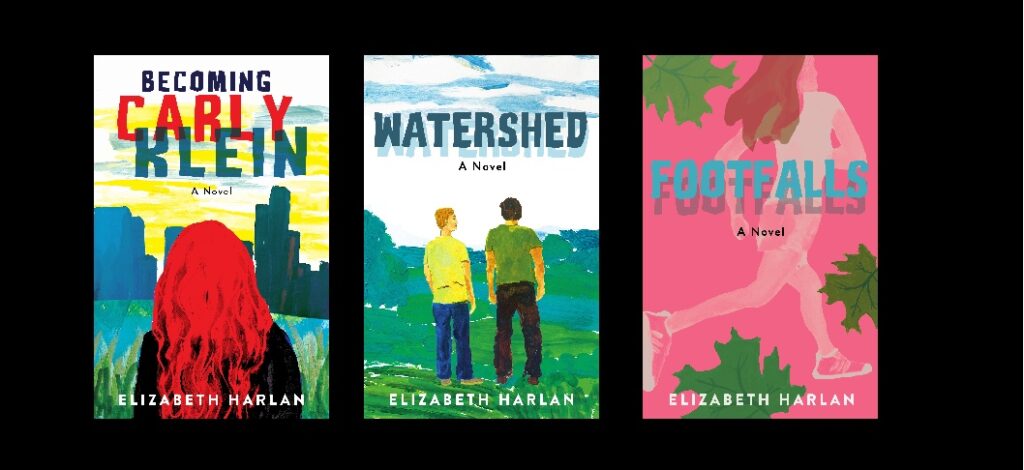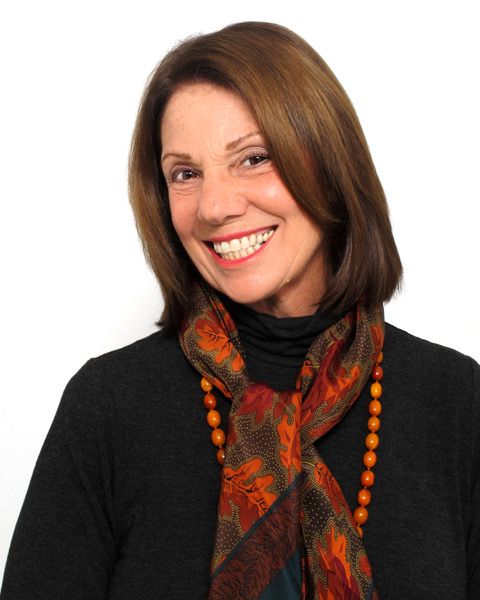 I have a small, select circle of “beta” readers with whom I share my work-in-progress. These are friends who bring divergent backgrounds and varied experiences to my writings. My objective is to reach out to all of them and, no mattter their differences, to engage their interest in my work.
I have a small, select circle of “beta” readers with whom I share my work-in-progress. These are friends who bring divergent backgrounds and varied experiences to my writings. My objective is to reach out to all of them and, no mattter their differences, to engage their interest in my work.
Elizabeth Harlan – 21 April 2025
The Back Flap
Neglected by self-absorbed parents who wind up divorcing by the time she’s sixteen, Carly Klein is sustained by her best friend, Lauren. But when Lauren and her family move away, Carly is forced to find new ways to entertain herself. It doesn’t take her long to locate the perfect subject: her therapist mother’s patients.
Carly soon becomes obsessed with one patient in particular—Daniel, a blind junior at Columbia College—and, desperate to become part of his life and knowing he’ll never go for a high school girl, gets close to him by pretending to be a student at neighboring Barnard College. Becoming Carly Klein follows Carly on a roller coaster romp through the exhilaration and disappointment of first love—and the unintended consequences of disguise, deception, and discovery.
About the book
What is the book about?
Becoming Carly Klein is the story of a toubled high school girl who invents an identity as a Barnard College student to attract the attention of her psychiatrist mother’s patient, Daniel, a blind junior at Columbia College.
When did you start writing the book?
This book began in the 1980’s as my thesis for my Columbia writing program MFA in fiction. Originally a linked set of autobiographically inspired short stories, this project evolved into the novel it has become during the Covid pandemic when I was sheltering at my home on a barrier island off Florida’s west coast.
How long did it take you to write it?
The story of Becoming Carly Klein has been in gestation for many, many years. If you factor in the above timeline, you could say it took forty years to write this novel, which I began in the 1980’s and which was published in 2024. But of course I wasn’t actively working on it during that whole time.
Sometimes a writing project morphs from conception to execution over the course of a long period of time as it evolves from a kernel of inspiration to the form it finally takes. The new book I’m now working on started ten years ago as a nonfiction, historical study of a special French cheese and has evolved into a novel set during the German Occupation of France that tells the story of a young girl who grows up in a farm family that produces this cheese. The bottom line, and the good news is that the story I’m now telling is a whole lot more lively and engaging than the one I set out to tell ten years ago.
Where did you get the idea from?
When I was a young person around Carly Klein’s age, I visited a psychiatrist who worked out of her apartment in New York City. I would occasionally cross paths with this therapist’s young daughter in the hall outside the therapy room or by the elevator. I always wondered what this girl thought about her mother’s patients and what she imagined about their lives and problems. Quite clearly, Carly is an elaborately developed descendent of this girl and my fictionalized projection of her experience.
Were there any parts of the book where you struggled?
My biggest struggle was with this book’s original form and the necessary developmental change it underwent. I began writitng the novel from the perspective of the mother, but when I showed an early draft to a former literary agent, he suggested that the story would be enlivened if told from the point of view of her daughter. Once the POV transitioned, the story shaped up and Becoming Carly Klein was born.
What came easily?
Carly’s voice came easily, once I decided that this was her story. As soon as I commited to Carly’s POV, she spoke up loud and clear, insisting upon her anger and frustration, her hurts and disappointments, and her hopes and dreams. Because Carly’s voice is strong and strident, the story is captivating and flows credibly.
Are your characters entirely fictitious or have you borrowed from real world people you know?
I’ve borrowed abundantly from real world people I’ve known. Carly’s friend, Lauren, is closely modeled on one of my own best friends from when I was growing up. Lauren’s mom, Tibou, is closely modeled on this friend’s mother. I envied this friend and wished I were her sister so I could have been brought up in her home. Other characters are more purely made up, often in response to the needs and demands of the story I’m telling. Carly’s boyfriend, Daniel, doesn’t remind me of anyone in particular from my past, but I needed to make him someone credible and complex who would seek help from a psychiatrist and who could, at the same time, attract Carly’s interest and catalyze her growth and development.
We all know how important it is for writers to read. Are there any particular authors that have influenced how you write and, if so, how have they influenced you?
I like to think of other authors as being inspirational rather than influential. I’ve been inspired by many, many authors, but particularly by those who capture the experience of a young person coming of age while struggling with adversity. I especially love A Little Princess by Frances Hodgson Burnett, which I read many times while I was growing up. Scott O’Dell’s Island of the Blue Dolphins Is another favorite, along with Jean Auel’s Clan of the Cave Bear series. Each of these novels, along with many others by which I’ve been inspired, tells the story of a young girl who bravely prevails when challenged by grave and seemingly insurmountable odds.
Do you have a target reader?
I have a small, select circle of “beta” readers with whom I share my work-in-progress. These are friends who bring divergent backgrounds and varied experiences to my writings. My objective is to reach out to all of them and, no mattter their differences, to engage their interest in my work. What I want to hear back from them, in addition to constructive criticism and suggestions, is that they want MORE of the story I’m telling, that they want to turn more pages and read on. This incentivizes me to continue writing.
About Writing
Do you have a writing process? If so can you please describe it?
I often start a section or passage of my writing with an email to an imagined friend. I lay out the story I want to tell and describe my characters’ feelings, problems, and objectives. If I have a problem with something—plot twists, description, character development, whatever—I run through possible approaches and resolutions. This process, rather than a formal outline, frees me up and provides a place to start. Rather than facing a blank page, writing a casual email often “tricks” me into beginning a draft.
Do you outline? If so, do you do so extensively or just chapter headings and a couple of sentences?
I don’t outline. I prefer a more instinctual, intuitive approach to writing, as described above. Sometimes, especially when a scene or section contains a lot of elements and information, I make a list so I won’t omit anything important. But my practice is to proceed casually and comfortably so I don’t get uptight about the writing process. I can always tighten up what I write and make it more precise and focused and, if necessary, more formal. It’s much more difficult going in the other direction, and much of my fiction requires a lifelike mood and feel that’s natural and relaxed.
Do you edit as you go or wait until you’ve finished?
I edit extensively as I go, which is what I love about writing on a computer. I began my writing career handwriting and using a typewriter. The computer allows me the ease and flexibility of drafting with frequent changes. I still enjoy reading hard copy of my writing, and after a good, productive session I’ll print out what I’ve drafted and put a pen to my pages for what usually amounts to minor edits. If something needs a more major revision, I’ll go back to drafting on the computer.
Did you hire a professional editor?
Yes, I worked with a remarkable developmental editor, John Paine, who helped me make sense of Becoming Carly Klein when I couldn’t see the forest for the trees. And once this novel was accepted, I went back to John Paine to prepare the manuscript for publication. I plan to use his services for my new novel and recommend him frequently to friends and fellow writers.
Do you listen to music while you write? If yes, what gets the fingers tapping?
No, I like silence when I write. Or, to put it more creatively, I like to make my own music out of my own thoughts, ideas, and words.
About Publishing
Did you submit your work to Agents?
Yes, in the past, and these agents were very helpful in selling my previous books. With Becoming Carly Klein, which is my first Indie publication, I submitted directly to my publisher.
What made you decide to go Indie, whether self-publishing or with an indie publisher? Was it a particular event or a gradual process?
I was attracted by the stellar reputation of Indie publisher She Writes and SparkPress and the interactive process of working with them vs. traditional publishers such as Atheneum, Viking, or Yale University Press, with whom I’ve published in the past.
Did you get your book cover professionally done or did you do it yourself?
Becoming Carly Klein’s cover was professionally designed by Rebecca Lown and Thea McRae, a gifted team who has just produced the new covers for my soon-to-be reissued earlier novels, Footfalls and Watershed.
Do you have a marketing plan for the book or are you just winging it?
I wouldn’t dream of winging it in today’s complex and media driven literary market. I’m delighted to be working with Jenn Vance and Hannah Robertson at Books Forward, who are charged with developing and implementing a marketing plan for Becoming Carly Klein.
Any advice that you would like to give to other newbies considering becoming Indie authors?
Go for it! And be sure to give Brooke Warner at She Writes Press a chance to check out your manuscript! If you’re lucky enough to be taken on, you won’t be sorry.
About You
Where did you grow up?
In New York City—Carly’s stomping ground—and on the east end of Long Island, where I spent summers.
Where do you live now?
On the Peconic Bay on the east end of Long Island and on a remote barrier island off Florida’s west coast.
What would you like readers to know about you?
That nothing could please me more than to hear back from them about how they feel about my books.
What are you working on now?
So pleased you asked! My present project in an historical fiction set in the Alpine region of Haute-Savoie during the German Occupation of France in World War II. The novel’s lead character, Gabrielle, is a seventeen-year-old French girl whose family produces a traditional cheese called Reblochon. Unbeknownst to her father, who sympathizes with the collaborationist Vichy government, Gabrielle is provisioning her boyfriend’s troop of Maquis (Resistance fighters hiding out in the mountainous countryside), with wheels of Reblochon to sustain them as they organize attacks on the occupying Nazi forces. When her boyfriend’s camp is raided by the Nazis, the cheese is traced back to Gabrielle’s family farm. To avoid spoilers, I won’t say more, but I’m thrilled to be working in a format that draws on my skills as a novelist and my nonfictiion experience writing historical biography. Not to mention my love of France and French cheese!
End of Interview:
For more from Elizabeth Harlan visit her website.
Get your copy of Becoming Carly Klein from Amazon US.


